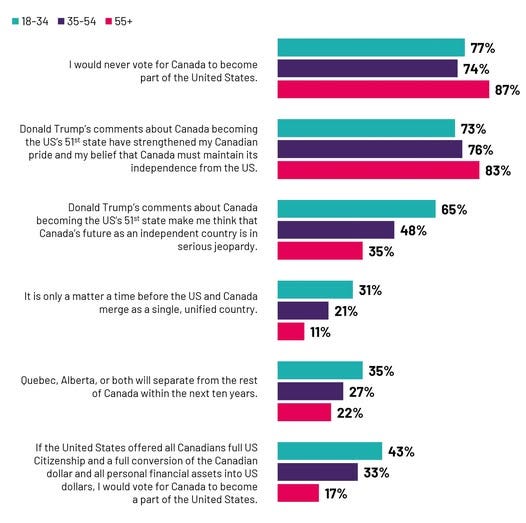Et Tu Canada?
It turns out Canadians aren't so excited about joining the United States
Good Morning:

Yesterday on #DogShirtTV, the estimable Alicia Wanless, the estimable Minna Ålander, and I welcomed the estimable Joel Linnainmäki, who attended the Munich security conference last week and left in shock over it and needing to vent. The estimable Jonathan Rauch showed up for fellowship. We talked about how Europe should approach its own defense now that the US is siding with the despots.
Also, I was in an airport and my sound quality was thus lousy. Because this is a revolution in morning television:
Today On Lawfare
Compiled by the estimable Caroline Cornett
What Would Bombing Mexico Accomplish?
In the latest installment of Lawfare’s Foreign Policy Essay series, Daniel DePetris explains why a military operation against cartels in Mexico—a policy which many Trump administration officials support—will fail to limit the flow of drugs across the border and instead imperil United States-Mexico relations:
Whether or not Trump is serious about launching a military operation against Mexican cartels or is merely using the rhetoric to spur Mexican authorities to get more aggressive themselves is difficult to say. But given his past comments, it is worth examining whether such an option would actually stem the flow of fentanyl into the United States or hamper the cartels’ capacity to inflict violence. The answer is straightforward: no. In fact, U.S. military operations inside Mexico are likely to make all the problems Trump supposedly wants to solve exponentially worse.
Birthright Citizenship and the Obscure Right of Expatriation
Jonathan Shaub criticizes an op-ed by Randy Barnett and Ilan Wurnell suggesting that the phrase “subject to the jurisdiction thereof” in the 14th Amendment can be construed as excluding persons who have unlawfully entered the United States. Shaub argues that this language enshrines the right to expatriation, not the “allegiance-for-protection” theory that Barnett and Wurnell invoked:
But there is another fundamental problem with the allegiance-for-protection theory, one that becomes evident in light of the contemporary history and consideration of expatriation, the technical term for the renunciation of citizenship. Underlying the Barnett/Wurman hypothesis is the presumption that the “subject to the jurisdiction” language in the Citizenship Clause was intended to exclude certain populations from citizenship—i.e., those who had not given sufficient “allegiance.” But this is not the only, nor the best, reading of the purpose of this language. The phrase could also be understood as an attempt to protect certain populations from the automatic imposition of citizenship, granting them an exception from the general rule of birthright citizenship, or jus soli, adopted in the Citizenship Clause.
IEEPA Tariffs’ Many Legal Challenges
Addar Levi evaluates Peter Harell’s recent argument for the major questions doctrine (MQD) as a challenge to tariffs imposed through International Emergency Economic Powers Act (IEEPA), asserting that courts’ reluctance to contradict presidential national emergency declarations makes use of the MQD unlikely. Levi suggests IEEPA limits on the action to address an emergency are a more promising avenue for legal challenges to wide-ranging tariffs:
In his piece, Harrell suggested that deference to the executive branch with respect to the president’s invocation of IEEPA is eroding and that the major questions doctrine is likely the “most persuasive” argument against IEEPA tariffs. However, more promising angles for a challenge to these executive orders would be challenging the fit between the national emergency and the actions imposed and assessing whether the actions Customs and Border Protection (CBP) needs to take in order to implement the executive orders are subject to rulemaking requirements under the Administrative Procedure Act (APA).
Models for Transitional Justice in Syria
Mietek Boduszyński and Susan Henneberg draw from Tunisia, Libya, and Iraq’s implementations of transitional justice (TJ) to make recommendations for how Syria can use transitional justice to shape a democratic post-Assad future, including refraining from retributive justice and prioritizing victims:
Although TJ is critical for ensuring a peaceful and sustainable transition from authoritarian rule, the experiences of Tunisia, Libya, and Iraq show how interim decision-makers face a host of challenges in establishing such processes. Above all, Syrians will need to establish independent mechanisms for documenting abuses, both those occurring in the distant past and those that took place as part of the revolutionary struggle. Victims of human rights abuses want to know the truth. Additionally, the experiences of other countries in the region show that TJ is inextricably intertwined with other transitional processes. In other words, it is inherently political and must be buttressed by broader aspects of transition such as judicial, security sector, and economic reforms, as well as the involvement of civil society and local governments. The political isolation law in Libya resulted from revolutionary politics that gave too much power to unaccountable armed groups. In Iraq, a weak judiciary and rampant corruption undermined any attempts to pursue justice and accountability. And in Tunisia, failure to address economic concerns helped undermine stability and political progress—including efforts at TJ.
Podcasts
On Lawfare Daily, Matt Perault joins Kevin Frazier to discuss the current AI policy landscape and the Little Tech Agenda, and to explore how adoption of the Agenda may shape AI development across the country:
In a recording of a live conversation on Feb. 14, I speak to Scott R. Anderson, Anna Bower, and Roger Parloff about the status of the civil litigation against President Donald Trump’s executive actions, including the efforts to dismantle U.S. Agency for International Development and the Consumer Financial Protection Bureau, his firing of inspector generals, and the attempt to fire FBI agents and employees:
Today’s #BeastOfTheDay is the roe deer, seen here barking like a dog for some reason. Apparently, roe deer can do that:
In honor of today’s Beast, pretend to be a dog for a minute. It’s good for the soul.
Keep reading with a 7-day free trial
Subscribe to Dog Shirt Daily to keep reading this post and get 7 days of free access to the full post archives.




